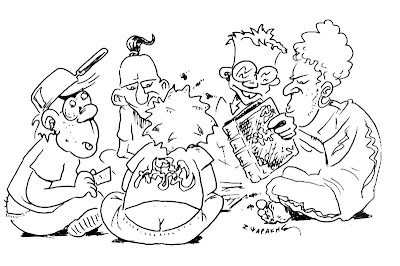
So, uh, let's start with a
disclaimer, shall we? Lovely.
If you are one of the few proper pen & paper RPG gamers frequenting Gnome's Lair, then you really don't need to read any further. Really. You'll probably know all there is to it. If, on the other hand, you are video gamer or preferably a video gamer that can appreciate the intricacies of
Fallout, the vast worlds of
Morrowind, the demented setting of
Planescape and truly enjoy your average (
or garden) video game RPG, then you might just be interested in finding out a bit more on them
pen & paper RPGs, the sources of inspiration behind every CRPG from
Ultima to
Fallout 3, in which case you should probably read on.
For starters, in an ideal world, nobody in their right mind would ever dream mentioning
pen & paper before the
RPG bit. The later should be enough, mainly because the vast majority of computer/video game RPGs (
CRPGs) lack the actual roleplaying bit, at least in the more traditional sense, which of course you wouldn't know unless you had already played a real RPG, something rather impossible as you wouldn't be reading this very article, would you now? Anyway. All a CRPG ever did to earn its
role-playing title was borrow some ideas (
e.g. character creation), game mechanics (
e.g. combat, hit points, to-hit modifiers) and/or setting (e.g. The Forgotten Realms, Shadowrun), but never came close to emulating the true, traditional, wholesome, imaginative, wholly satanic and ridiculously time-consuming RPG experience.
 So, what is an RPG
So, what is an RPG? Well, it's a role playing game, that's what it is. Players assume roles and act out impromptu parts -following certain rules and in thoroughly defined settings- much like actors in radio theatre. Only, this is interactive theatre. You not only take part in a story but actually help tell it, as you're absolutely free to do whatever crosses your mind.
How is this achieved? Simple. One of the players assumes the very important role of
Game Master, Storyteller, Dungeon Master, Keeper, whatever. Let's call him -as most RPGers do- the
GM. Well, said GM's job is to act as the other players' senses, describing everything they see hear and smell, as the general organizer of play, as the narrator of the main plot and as the ultimate rules referee. His or her job, essentially, is to be what a PC or games console is -say- to an
Oblivion gamer: the screen, the speakers, the physics engine, the enemy A.I., the voice of Patrick Stewart. The major difference though is that a GM, unlike even 2
PS3s supported by a
Pentium 5, can react and adopt to absolutely anything a player might come up with...
Hence the importance of the rest of the players in the storytelling part. They are free to experience, twist, enrich, play through and ultimately shape the GM's plot, always following some rules, not unlike those a video game would impose on a gamer. Rules, that determine whether a player kills a monster, is stealthy enough to bypass a drowsy guard or even adequately desirable to organise an orgy. What's more, and just like in the vast majority of CRPGs, players get to create a character, an in-game persona, typically called the
PC or
Player Character, as opposed to the
NPC or
Non Player Character, obviously played by the GM.

What must absolutely be understood is that the GM is not the adversary of the players. He or she is just an instrumental part of a group of people enjoying a storytelling game. After all, there is no antagonism among players. Nobody can
win in the traditional way and the game never really needs to end, as PCs grow older, more experienced and set forth for new adventures (
in true MMORPG fashion). RPGs are collaborative, social, storytelling, imaginative affairs, totally unlike board and war games, even though they might share the use of dice -usually to determine the success of an action, be it combat or not.
Now, provided you're even slightly intrigued, here are some pretty popular games/systems/settings (
they usually come in the guise of books, you know, them nice papery things) to get you started. Surely you'll recognize some of the names...
Dungeons and Dragons (
the father of the modern RPG, pretty complex, but perfectly balanced rules, huge variety of mostly fantasy settings),
Call of Cthulhu (
simple rules, fantastic insanity system, spawn of Lovecraft, brilliant and comfortably short scenarios)
Vampire / WoD (
simple and extremely versatile rules, Gothic feel, excellent prose),
Shadowrun (
very tactical, smart hacking mechanics, cyberpunk meets fantasy setting),
Rolemaster (
more complex than an accountant's spreadsheet, but weirdly enjoyable) and the utterly notorious
Aftermath!.
Anything else you care to know? Well, that's what the comments section is for, you know...
:
Tons of free character sheets,
a hilarious RPG mockumentary,
lawful and uncensored RPG sex
 I mean, really, how often have you used a virtual table top? Let alone an online one... Anyway, it seems they can come in quite a bit handy, provided you're not looking forward to putting your ornate tequila glass on them, but rather using them for some lovely pen & paper RPG gaming with your friends. Online, that is.
I mean, really, how often have you used a virtual table top? Let alone an online one... Anyway, it seems they can come in quite a bit handy, provided you're not looking forward to putting your ornate tequila glass on them, but rather using them for some lovely pen & paper RPG gaming with your friends. Online, that is.























